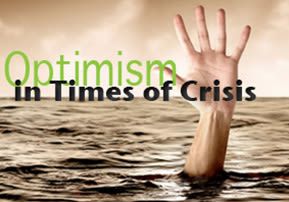
Optimism in Times of Crisis
With many threats against Israel, the eternally-truthful words of the generation’s true tzaddikim help put things in their proper perspective.

Rebbe Menachem Mendel Schneerson, the Lubavitcher Rebbe, of saintly and blessed memory
Editor’s note: The Lubavitcher Rebbe’s encouraging words are what we need to hear today. The hashkafa, or outlook, of the true tzaddikim all take us to the same place, namely, to the world of emuna where we know that Hashem not only does everything, but everything he does is for the very best.
At a time when the eyes of the world are anxiously focused on the exploits of ‘the king of Babylon,’ the message that these talks consistently radiate is — quiet optimism. This message does not defy reality: it does not for a moment advocate that natural responses to the current situation should be abandoned. At the same time, however, we ought to take to heart the advice of the Tzemach Tzedek: ‘Think good, and the outcome will be good.’ For, as the above-mentioned passage from Yalkut Shimoni reassures us, when ‘the entire world will panic and will be stricken with consternation,’ our people can remain at ease, confident in the Creator’s promise that ‘Whatever I have done, I have done only for your sake. Why are you afraid? Have no fear: the time for your redemption has arrived!’
In a time of personal crisis, the Tzemach Tzedek once advised one of his followers, ‘Think good and the outcome will be good.’ The optimism this directive encourages is not euphoric. Instead, it is based on the firm belief that everything which transpires in the world is guided by G-d’s Providence and ‘Everything the Merciful One does is intended for the good.’ When a person internalizes this belief, his life is suffused with bitachon (confident trust) and he is able to carry out productive and fruitful activities without being inhibited by worry or fear.
Bitachon is the very opposite of escapism. It does not mean that a person should believe that because G-d’s mercies are infinite, He will save him without any effort on his part, or that whether his conduct is worthy or unworthy, he will prosper. Instead, it requires a person to act maturely within the world and employ all the natural means at his disposal. Nevertheless, he should realize that these efforts can never, in and of themselves, promise success. Therefore, one must ‘cast your burden on G-d,’ confident that ‘He will sustain you.’
When a person has total dependence on G-d, he has the confidence to face trials and challenges. He does not shirk his responsibilities or try to avoid difficulties. When confronting them, however, he does not place his trust in his own efforts, but in G-d. He relies on Him alone, fully confident that G-d will bring him open and revealed good.
This approach of total and complete reliance is sufficient in itself to evoke positive Divine influence. In response to a person’s efforts to arouse his trust and confidence in G-d, G-d creates situations which allow him to use his energies in positive and beneficial ways.
If the above applies in the individual sphere, it is surely relevant when a major portion of the Jewish nation, millions of Jewish men, women, and children, are involved…Despite all the trials to which our people have been subjected in the present exile, ‘even the least worthy member of our people possesses as many mitzvot as a pomegranate possesses seeds.’ Indeed, ‘Your people are all righteous…, They are the branch of My planting, the work of My hands, in which I take pride.’ G-d takes great pride in every Jew. There is no way our mortal wisdom can comprehend the immense merit every Jew possesses.
This is what is required of us at present — to emphasize the virtues of every Jew, to spread love and unity among the Jewish people, and to encourage the observance of the Torah and its mitzvot in our everyday lives. As the Rambam writes, ‘with one mitzvah, one can tip his personal balance and that of the entire world to the side of merit and bring deliverance and salvation.’
These activities will no doubt call down G-d’s benevolence. We say in our prayers, ‘Bless us, our Father, all of us as one.’ The Alter Rebbe explains that when we are ‘as one,’ united by bonds of unity, we are worthy of blessing — including the ultimate blessing, the coming of Mashiach.
(An adaptation of statements of the Lubavitcher Rebbe, Rabbi Menachem M. Schneerson, at public addresses (Shabbos Parshas Vayechi and Shabbos Parshas Shmos) in Likkutei Sichos Parshas Shmos, 5751 (1991), reprinted with kind permission of Rabbi Yitzchak Turner of www.sichosinenglish.org)











Tell us what you think!
Thank you for your comment!
It will be published after approval by the Editor.